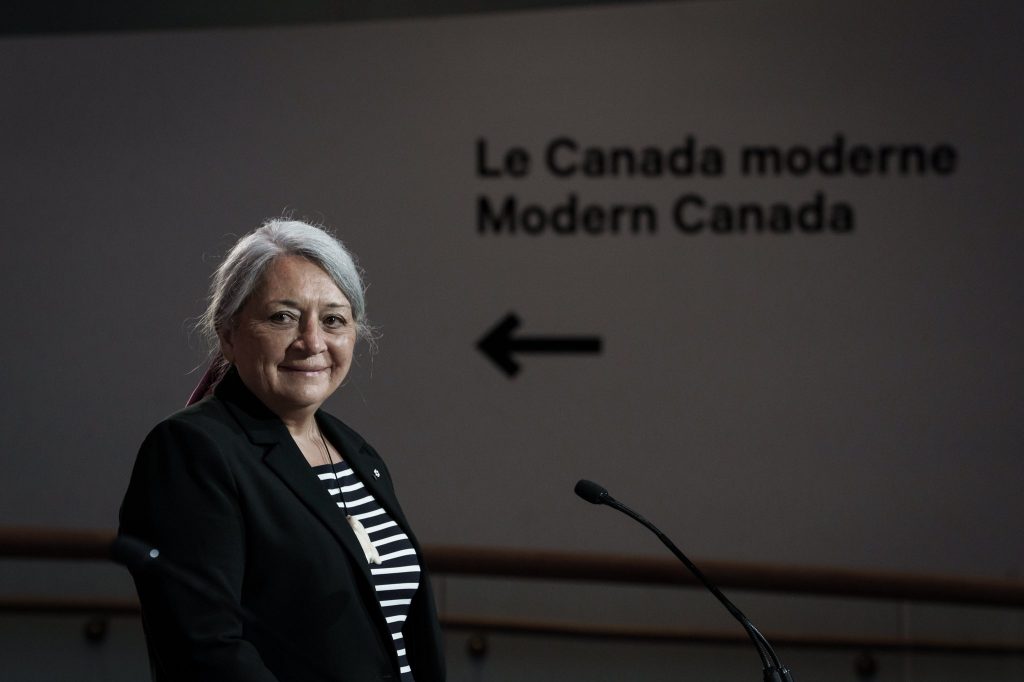The Burdens of Office Will be Heavy for the New Governor-General

Philippe Lagassé
July 6, 2021
Canada will soon have a new governor-general: Mary J. May Simon of Kuujjuaq, Nunavik, a former head of the Inuit Tapiriit Kanatami, the National Inuit Organization, and a seasoned diplomat who played a leading role in establishing the Arctic Council, among many other achievements. Mary Simon is well-placed to serve as governor-general. The vice-regal office is steeped in protocol and guided by a stringent choreography. As exemplified by the Queen herself, performing the duties of the head of state and nation requires a solid understanding of the Crown’s script in a constitutional monarchy. Given her experience as an ambassador and community leader, Simon should have no trouble fulfilling her functions.
Yet our new governor-general will also face a series of challenges that will not be simple to navigate. Indeed, given the sad state of the vice-regal office and our reckoning with colonialism and sexual misconduct in the military, Her Excellency will carry a heavier burden than her predecessors.
Julie Payette’s resignation amid allegations of workplace harassment left a stain on the office of the governor-general. Parliamentarians are questioning the governor-general’s pension and the public is understandably wondering why Canada needs this office at all. While constitutional experts are quick to point out that making substantial changes to the governor-general’s office would involve the unanimous constitutional amending procedure, this is not a satisfactory answer when people are questioning the very purpose and legitimacy of this position.
Given the sad state of the vice-regal office and our reckoning with colonialism and sexual misconduct in the military, Her Excellency will carry a heavier burden than her predecessors.
Simon, therefore, will need to devote herself to rehabilitating the reputation and image of the vice-regal representative. Among other things, this should involve making the governor-general a more visible presence across the country, be it through a higher number of public engagements or a renewed focus on the office’s role as the non-partisan figure who represents Canadians to themselves.
Even if Simon is ready to give her office greater presence and visibility, she will be confronted by a complicating factor: our longstanding tendency to see the prime minister not only as the head of government, but as the representative of the people writ large. Although the idea that the prime minister has become presidential is overblown, it is certainly the case that the line between the roles of the head of government and head of state is blurred, particularly when it comes to speaking for, and apologizing on behalf of, Canadians. It is unlikely that any governor-general could reverse this trend, but Simon will need to find ways to remind Canadians that she represents them as well, without running afoul of the Prime Minister’s Office.
A second challenge Simon will face is rethinking the governor-general’s involvement in Canada’s reconciliation with Indigenous peoples. Colonialism’s crimes and horrors have been committed by those acting in the Crown’s name and under its authority. Coupled with the fact that many First Nations have treaties with the Crown, and that the Crown is honour bound to these foundational agreements, the Queen’s representative may be called upon to be more directly involved in reconciliation.
At the very least, the governor-general must be free to speak openly and honestly about the systemic injustices and violence inflicted on Indigenous peoples, past and present. For the governor-general to do so, however, Ottawa must be prepared to loosen the rules that prevent the vice-regal representative from taking a stand on contentious issues. Simon, moreover, may need to develop her own understanding of her role in reconciliation and in addressing what will likely be a steady stream of tragic revelations about Canada’s treatment of Indigenous peoples.
As per the Letters Patent 1947, the governor-general is commander-in-chief of Canada’s armed forces. Although the commander-in-chief’s role is mostly symbolic, it focuses the military’s service and loyalty on a non-partisan authority; no matter how presidential Canadian prime ministers become, they will not be able to fashion themselves as the commander-in-chief. The governor-general, furthermore, has an important relationship with the military, as evidenced by the GG’s signature on officers’ commissions, the Judge Advocate General’s statutory responsibility as a legal adviser, and the numerous honours bestowed on service members.
As commander-in-chief, Simon will need to consider how she will address the military’s mishandling of sexual misconduct. Silence may be one option, but it will hopefully not be the one she chooses. The commander-in-chief represents all members of the Canadian Armed Forces, including those who feel that the senior leadership has let them down. Simon can let them know that she understands their frustrations and anger. She can assure them that she will stress the importance of addressing sexual misconduct during meetings with the chief of the defence staff, the defence minister, and the prime minister.
Simon will need to consider how she will address the military’s mishandling of sexual misconduct. Silence may be one option, but it will hopefully not be the one she chooses.
Although she has no direct authority to address this crisis, the governor-general can use her standing as commander-in-chief to assure members of the armed forces that the necessity of solving the problem is understood and appreciated at the highest levels.
Canadians can take heart that Prime Minister Trudeau has recommended that the Queen appoint Simon as governor-general. The second-highest office of the Canadian state, after the Queen herself, has been vacant for too long. And with an election looming, there should be a governor general in place to dissolve and summon Parliament.
The governor-general-designate has the experience to fulfill her constitutional and representative functions. To surmount the wider challenges she will face, she may need to push past the well-established boundaries that surround the office. We should support her if she does.
Contributing Writer Philippe Lagassé is associate professor and Barton Chair at Carleton University.
